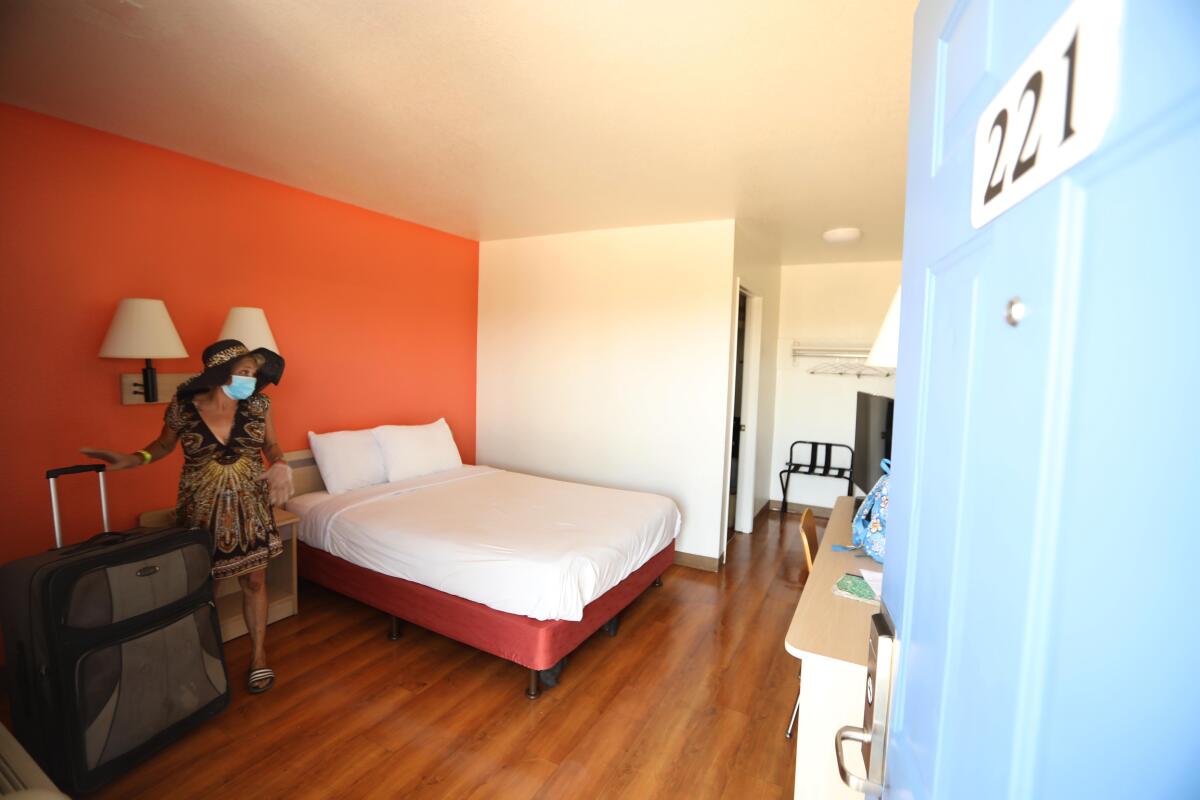Editorial: L.A. has a chance to lease all the hotel rooms it can find for homeless people. Go for it

The goal of Project Roomkey, a federally subsidized effort to shelter homeless people in hotels and motels largely emptied by the pandemic, was to find rooms for 15,000 people in Los Angeles. Instead, at its peak, the program housed about 4,300 people. Still, that was 4,300 people off the streets for weeks if not months while COVID-19 was raging — and in rooms of their own. The program started to ramp down late last year as leases gradually ended and the Federal Emergency Management Agency was expected to stop its reimbursements, which covered 75% of the costs.
But on Jan. 21, President Biden signed an executive order calling on FEMA to raise that reimbursement rate to 100% through September (and this week, he made the full reimbursement rate retroactive to the start of the pandemic). That would offer a tremendous boost to, arguably, the best shelter program Los Angeles city and county have ever run. Short of permanent housing, which continues to be the goal, this is the kind of individual housing — a private bedroom with a bathroom — that homeless people need during a pandemic and beyond.
Still, even this profusion of unexpected extra dollars — “manna from heaven,” L.A. City Councilman Mike Bonin called it — doesn’t guarantee a continuation of Project Roomkey. Here’s the biggest problem: The city and county have to shell out the money upfront for leases. FEMA tends to reimburse governments around the 12th of Never.
OK, it’s not quite that bad — in reality, county and city officials expect about an 18-month wait for reimbursement from FEMA. But that’s unworkable. County officials estimate they’ve spent a total of $108 million for which they can seek reimbursement from FEMA. At this point, the county has received $12.5 million in reimbursements.
It’s good that the 100% reimbursement formula for newly leased rooms will be retroactive to all the rooms leased since Project Roomkey started last year. But it’s not feasible for the county and city to continue to spend tens of millions of dollars upfront while they wait a year or more for reimbursement.
The best plan would be for the state to lend the city and county the money they need to go ahead with Project Roomkey. Those funds could later be paid back with the reimbursement from FEMA. City and county officials are already discussing the possibility of a funding arrangement with the state.
Meanwhile, the city and county should waste no time going back to the hotels and motels that ramped down their Project Roomkey efforts and ask them to reenlist. It was a challenge getting some of the larger hotels on board last year. Owners were sometimes reluctant to have homeless people living in their hotels, and even when the owners were willing, some hotels’ insurance companies or investors balked. Not only is that shameful, it’s bad business. The pandemic is still raging, hotel rooms are still going begging, and the county and city are offering long-term leases on rooms along with guarantees to fix any damages.
With reimbursement a sure thing through September, officials should try to lease as many rooms as they can. There were 66,000 homeless people in the county at the last count — the majority of whom were living on the streets, not in shelters. But there are complications. Every hotel and motel in Project Roomkey is supposed to have a service provider on-site to help people obtain services and get into permanent housing. But the ranks of service providers are stretched thin.
Then there is this troubling scenario: What if Los Angeles succeeds at leasing tens of thousands of rooms and filling them with homeless people, but then there’s not enough housing or shelter for them in September when the FEMA reimbursements expire and the leases end? What if thousands of people are turned back onto the streets?
That’s a grim possibility that the city and county understandably do not want to face. But it shouldn’t stop them from aggressively pursuing all the hotel rooms they can secure now. Yes, they need an exit strategy. But with winter weather and a pandemic now gripping the region, homelessness is too much of an emergency to not find as many rooms at as many inns as they can.
More to Read
A cure for the common opinion
Get thought-provoking perspectives with our weekly newsletter.
You may occasionally receive promotional content from the Los Angeles Times.










